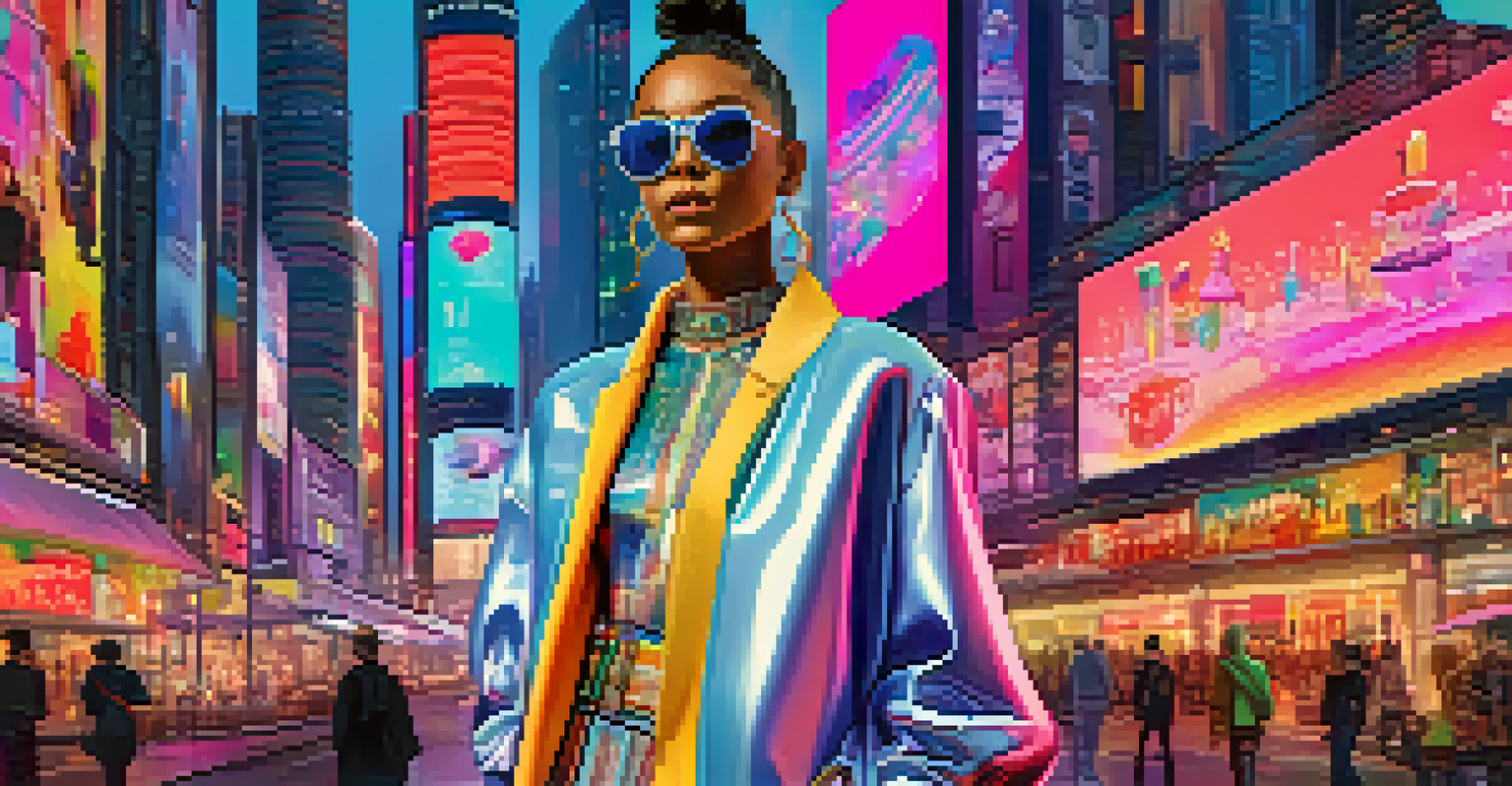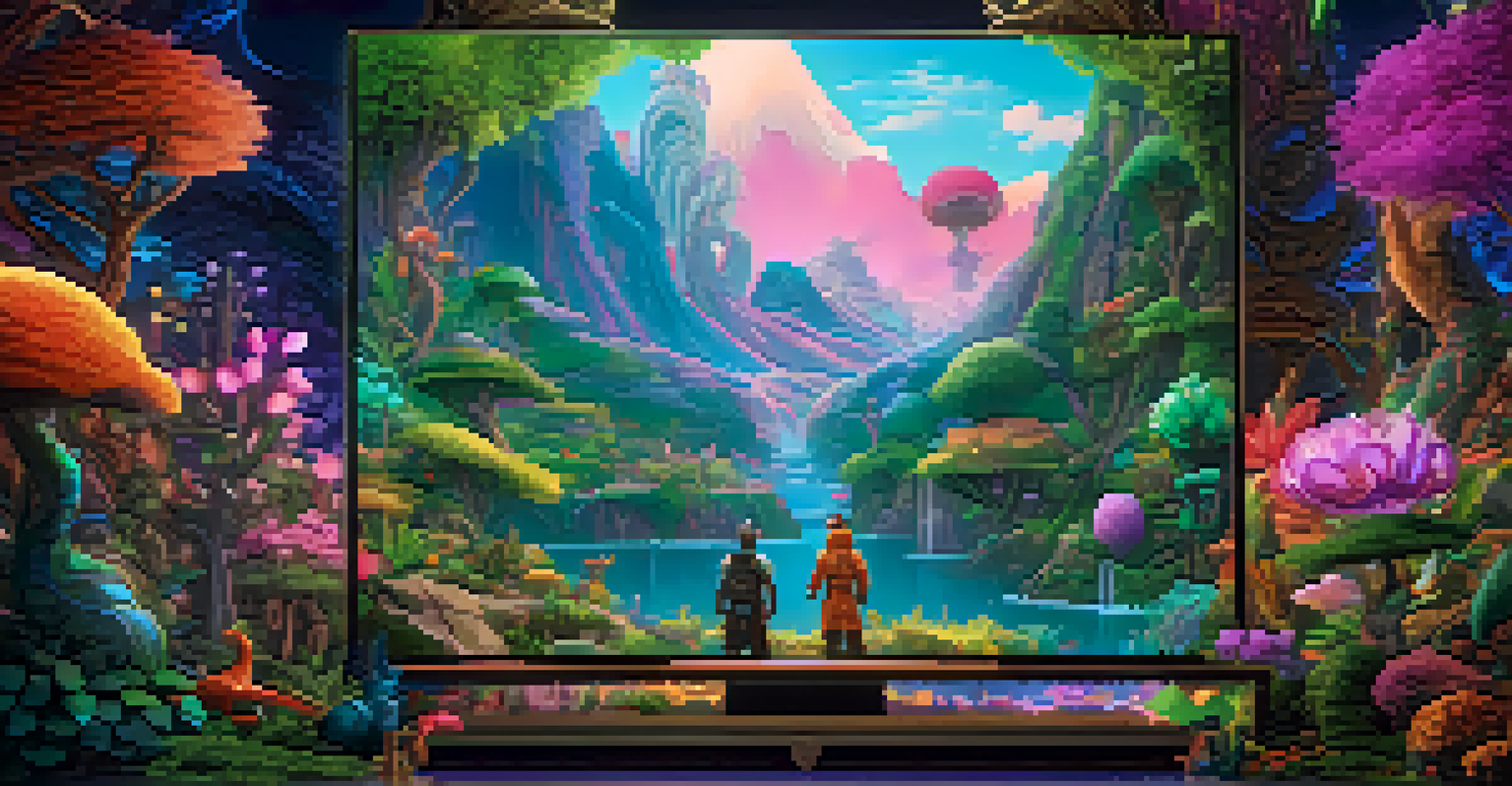NFTs Empowering Digital Identity: Case Studies and Examples

Understanding NFTs and Their Role in Digital Identity
NFTs, or non-fungible tokens, are unique digital assets stored on a blockchain. Unlike cryptocurrencies, which are interchangeable, NFTs represent ownership of a specific item, whether it be art, music, or even virtual real estate. This uniqueness is what makes NFTs especially powerful for digital identity, allowing individuals to assert ownership and authenticity in a virtual space.
NFTs are not just a trend; they are a new way of thinking about ownership and identity in the digital age.
In the digital world, where everything can be copied, NFTs provide a way to verify and showcase one's identity through unique digital collectibles. Imagine having a digital badge that not only represents your achievements but is also unmistakably yours, thanks to blockchain technology. This creates a sense of trust and accountability, which is essential in online interactions.
As we delve deeper into the concept of digital identity, it's clear that NFTs can be more than just collectibles. They can encapsulate personal values, achievements, and narratives, forming a new layer of identity that exists alongside our physical selves, enhancing how we present ourselves online.
Case Study: Virtual Fashion and NFTs
The fashion industry has started to embrace NFTs, creating a unique intersection between style and digital identity. For example, brands like Gucci and Balenciaga are releasing virtual clothing that can be worn by avatars in online spaces, allowing users to express their fashion sense without the limitations of physical garments. This not only democratizes fashion but also allows individuals to curate their identities in virtual environments.

Imagine purchasing a digital outfit for your online avatar that is an exact replica of a limited-edition piece from a renowned designer. This way, owning the NFT of that outfit isn’t just about the virtual item; it's about the status and identity it conveys in the digital world. Such innovations are reshaping how consumers view fashion, shifting from mere ownership to a more personal, expressive experience.
NFTs Enhance Digital Identity
NFTs provide a way to assert ownership and authenticity in the digital space, transforming how individuals express their identities online.
Moreover, virtual fashion NFTs can be resold, giving them intrinsic value that transcends the digital realm. This creates a new market for digital fashion enthusiasts and allows individuals to not only express their identities but also gain financial returns, thus merging identity with investment in a groundbreaking way.
NFTs in Gaming: Shaping Player Identity
The gaming industry is another arena where NFTs are redefining digital identity. Games like Axie Infinity and Decentraland allow players to own in-game assets as NFTs, which can include characters, skins, and even virtual land. These assets are not just gameplay items; they represent the player’s achievements, strategies, and investment in the gaming world.
In the future, we will have digital identities that are as important as our physical identities, and NFTs will be a crucial part of that landscape.
When players invest time and resources into acquiring unique NFTs, they create a personal narrative that enhances their gaming identity. For example, owning a rare character or item can set a player apart in the gaming community, fostering a sense of individuality and pride. This ownership also translates to real-world value, as players can sell or trade their NFTs.
Furthermore, the ability to transfer these assets across different games and platforms solidifies their role in shaping a player's digital identity. This interconnectedness allows gamers to build a more cohesive and recognizable presence in the gaming universe, ultimately transforming how they engage with both the games and the broader community.
Art and NFTs: Expression of Identity and Culture
Artists are at the forefront of the NFT revolution, using this technology to express their identities and cultural narratives. Platforms like OpenSea and Rarible have empowered creators to mint their art as NFTs, giving them control over their work and how it is perceived in the digital landscape. This democratization of art allows for diverse voices to be heard and celebrated.
For instance, an artist can create a series of NFTs that reflect their cultural heritage, allowing them to share their story and connect with a global audience. This not only fosters appreciation for their work but also enhances their identity as a creator who represents a specific culture or community. By engaging with collectors who value these narratives, artists can build meaningful relationships.
Virtual Fashion Transforms Self-Expression
The integration of NFTs in fashion allows individuals to curate their identities through unique digital outfits, merging style with personal branding.
Moreover, the NFT space has introduced concepts like royalties, where artists receive ongoing compensation for sales in the secondary market. This innovation not only supports artists financially but also solidifies their identity in the art community, as they can continuously engage with their audience and reinvest in their creative endeavors.
Social Media and NFTs: Reinventing Personal Branding
Social media platforms are beginning to integrate NFTs, allowing users to showcase their digital assets as part of their personal branding. Twitter and Instagram, for example, have introduced features that enable users to display their NFT ownership directly on their profiles. This creates a visual representation of identity that extends beyond traditional social media metrics.
Imagine scrolling through your feed and seeing a friend proudly displaying their NFT artwork or digital collectibles. This not only highlights their interests and investments but also adds a layer of authenticity to their online persona. By sharing their unique digital items, users can connect with like-minded individuals, fostering communities around shared passions.
As individuals curate their digital presence through NFTs, they redefine what it means to have a personal brand. It becomes less about followers and likes and more about the genuine connections made through shared interests and values, ultimately enhancing how we perceive and engage with each other's identities online.
Challenges and Ethical Considerations in NFT Identity
While NFTs offer exciting opportunities for digital identity, there are challenges and ethical considerations to keep in mind. Issues such as copyright infringement and the potential for digital identity theft are significant concerns in the NFT space. As individuals create and trade unique assets, ensuring the authenticity and ownership of these items is paramount.
Moreover, the environmental impact of blockchain technology, particularly in energy-intensive proof-of-work systems, raises questions about sustainability. As awareness grows, many are advocating for greener alternatives, such as proof-of-stake systems, to mitigate these concerns. The conversation around ethical practices in the NFT space is critical as we shape the future of digital identity.
Challenges in NFT Ecosystem
Despite the opportunities presented by NFTs, issues like copyright infringement, environmental concerns, and accessibility challenges must be addressed.
Lastly, accessibility remains a concern, as not everyone has the resources or knowledge to engage with NFTs. Ensuring that this technology is inclusive and available to diverse populations is essential in creating a truly representative digital identity landscape. Addressing these challenges will help pave the way for a more equitable and sustainable NFT ecosystem.
The Future of NFTs and Digital Identity
Looking ahead, the evolution of NFTs will likely continue to influence how we define and express our digital identities. As technology advances, we may see more innovative applications of NFTs across various sectors, from healthcare to education. This could lead to a future where our digital identities are seamlessly integrated into our daily lives, enhancing personal connections and experiences.
Imagine a world where your educational achievements, professional certifications, and even health records are securely stored as NFTs. This would allow you to manage your identity more effectively, granting access to specific information when needed while maintaining privacy and security. The potential for NFTs to act as a digital passport is an exciting prospect worth exploring.

Ultimately, as we navigate this new terrain, it is crucial to foster a culture of creativity, inclusivity, and ethical practices in the NFT space. By doing so, we can ensure that the digital identities we create are authentic, meaningful, and reflective of the diverse experiences that make us who we are.